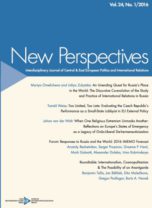(Inter)National Reconstruction. Revising Poststructuralist Encounters with the War in Bosnia and Herzegovina
(Inter)National Reconstruction. Revising Poststructuralist Encounters with the War in Bosnia and Herzegovina
Author(s): Tomáš DopitaSubject(s): Politics / Political Sciences
Published by: Ústav mezinárodních vztahů
Keywords: Bosnia and Herzegovina; Muslim; Croat; Serb; Bosniak; encounter; deconstruction;reconstruction;
Summary/Abstract: The most serious problems in Bosnia and Herzegovina today are linked to the political practicesof conflicting visions of nationhood and statehood. The international intervention in thecountry was expected to create self-sustaining political institutions and then withdraw. However,the fact that the intervention is ongoing shows its failure to do so. Many scholars haveengaged this issue, but this article shows that some of the analyses that have been most criticalof the international intervention also bring problems of their own. The article focuses onthe encounters between collective Subjects and the ways they have been constituted in relationto one another. It warns that without carefully identifying these Subjects we risk seriousmisinterpretations, such as equating BosnianMuslims, Bosniaks, and Bosnians. This misinterpretationoccurs in two major critical works in IR’s ‘poststructuralist canon’ that purport tocritically engage the situation and, particularly, the international intervention in Bosnia andHerzegovina –David Campbell’sNationalDeconstruction and LeneHansen’s Security as Practice.Campbell and Hansen rightly criticize the International Community’s ethno-cultural essentialism,but in their critique they apply Campbell’s radical-idealist version ofmulticulturalism.Based upon the ideal of a community without essence and the principle of affirming culturaldiversity without situating it, this approach is not able to identify the Subjects involved or theunwelcome radicalization of the excluded Subjects, which leads to flawed conclusions as tohowto sustainably resolve their conflict. In providing an academic corrective to such a hyperliberalbias, this article seeks to increase the room-for-manoeuvre of those who seek to createself-sustaining political institutions in Bosnia and Herzegovina.
- Issue Year: 23/2015
- Issue No: 2
- Page Range: 17-48
- Page Count: 32
- Language: English
- Content File-PDF

